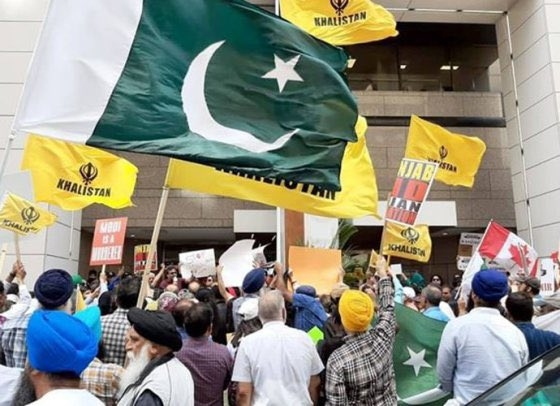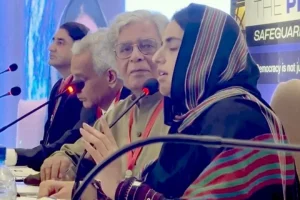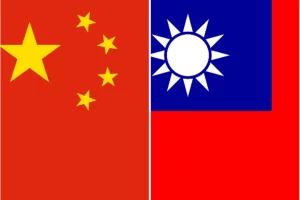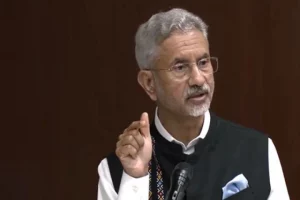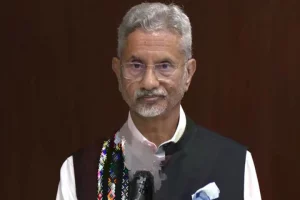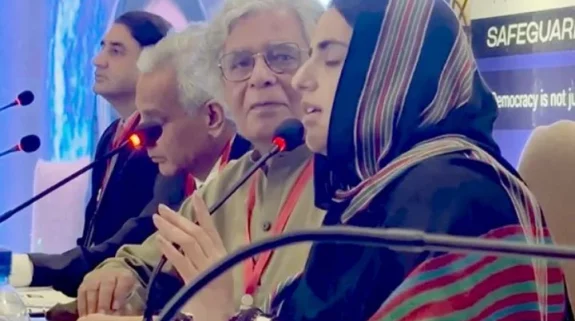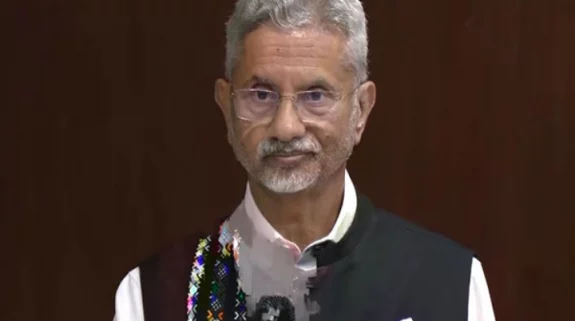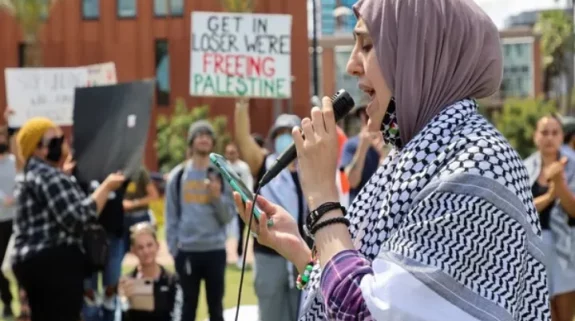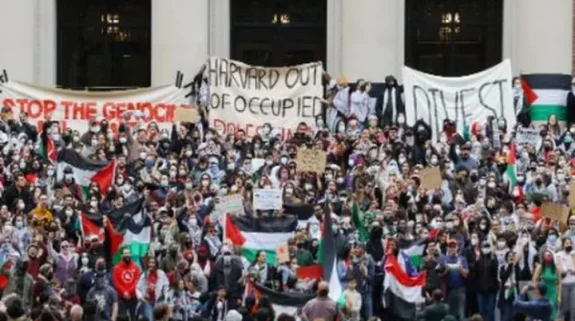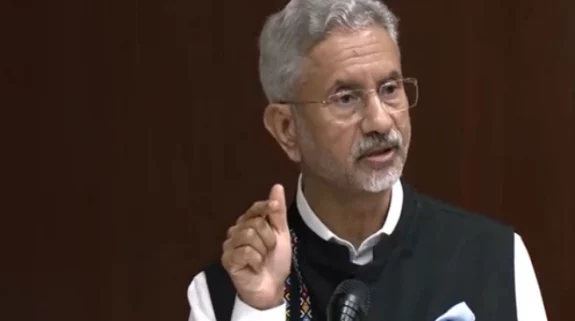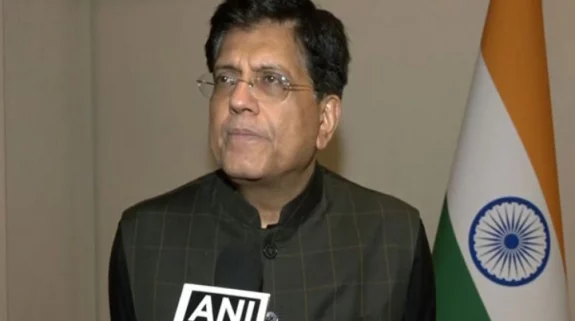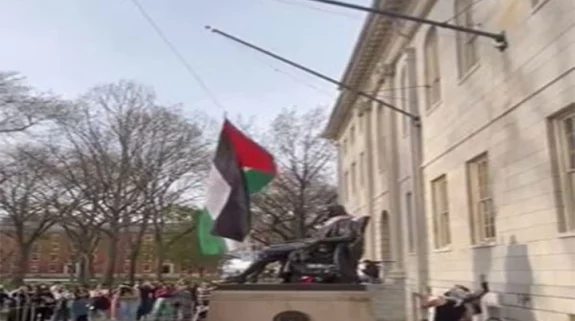The Khalistan movement, lately on the upswing again, not only adheres to the bigotry, extremism, patriarchy, and violence prevalent among the Jihadi terrorist groups but also has close ties with them in operational and strategic matters. Abetted by Pakistan, the movement in its new avatar is even more dangerous because it is projecting an image of a secular and liberal movement of a Sikh minority fighting against India’s oppressive Hindu majority for its right to self-determination. The current disaffection among farmers due to state curtailing subsidies under the new agricultural reforms gives space to the Khalistan movement, writes Abhinav Pandya, the founder and CEO of Usanas Foundation.
In a detailed piece published in the National Interest, published by The Center for the National Interest – a Washington-based public policy think tank, Pandya wrote that the Khalistan movement is not just a grave threat to India’s national security and an irritant in Indo-U.S. ties, but also an antithesis to the liberal and democratic societies of the Western world, where the separatists have found safe havens.
The Khalistan movement, based on the idea that Sikhs form a separate nation, was Pakistani General Muhammad Zia-ul-Haq’s strategy to bleed India through "a thousand cuts" to avenge the defeat of the 1971 war and creation of Bangladesh. The movement petered out by the early 1990s; however, lately, it has been on the rise again.
Many Khalistan leaders settled in Canada, the United States, and Western Europe have sustained the movement with the Pakistani support which has intensified its activities after the removal of Kashmir's special status.
In 2007, Khalistan leader Gurpatwant Singh started the 'Sikhs For Justice' (SFJ) forum to conduct 'Referendum 2020' (a referendum among the global Sikh community by 2020 to decide upon the separate homeland). In mainland Punjab, since 2015, its terror activities are seeing a revival.
Debunking two powerful myths associated with Khalistan 2.0, giving it a degree of legitimacy among the religious Sikhs and the secular civil rights activists, the author said that neither the movement is rooted in Sikhism fighting for its followers who are facing an existential threat from Hindu nationalism nor has firm faith in liberal values.
The SFJ, by lending support to Kashmir separatism and some of India’s populist civil rights movements with dubious ties to Islamist groups and Khalistani groups, is projecting an image of a civil rights movement with firm beliefs in Western liberal values. However, at its core, it continues to be a violent and extremist movement with no tolerance for liberal values like free speech, multiculturalism, democracy, and human rights, writes Pandya.
He says that today, when Khalistan leaders deny the brutal history of persecution of Sikhs at the hands of fanatical Islamist forces and seek Pakistan’s help, they stand rootless, and as opportunistic bigots thriving on blood money. Aligning with the same ideological forces, which killed Sikh gurus, they stand exposed as traitors of the Sikh community.
He refers to a report by the Canadian McDonald Laurier Institute which categorically states that the Khalistan movement is a Pakistani ISI-sponsored sabotage mission to create social unrest, disturbances, and disintegrate India through terrorist methods. Today, the Khalistan movement is aligned with ISI’s terrorist proxies like Jaish-e-Muhammad (JeM).
In 2019, it was revealed that JeM and Khalistani terrorists were operating hands-in-glove, smuggling weapons, narcotics, counterfeit currency, and ammunition into Indian territory (Punjab-Jammu border). JeM, a Jihadi terrorist group, represents those extremist values against which the Sikh gurus launched the militant Khalsa movement. At the same time, one hardly comes across any statement of Khalistani leaders condemning the persecution and marginalization of Sikhs in Pakistan, Afghanistan, and Indian Kashmir, at the hands of terrorist groups and Islamic extremists sponsored by Pakistan.
"The Pakistan Army desecrated Sikh gurudwaras, or places of worship, in Pakistan-occupied Kashmir. The list includes numerous historical gurudwaras such as Naluchi Sahab, Santpura Danna (Muzaffarabad), Singh Sabha (Ghari Dupatta), Chakothi gurudwara, and Domail (as told by Amanjit Singh, a Sikh activist from Kashmir). In Pakistan, the Sikh minority lives in perpetual fear and threat of Jihadist groups and clerics. Maulana Khadim Hussain Rizwi, Pakistan’s extremist Barelvi cleric, openly abused Sikhs and Maharaja Ranjit Singh, the founder of the Sikh kingdom," writes Pandya.
In 2019, a minor Sikh girl Jagjit Kaur, from Nankana Sahab, was kidnapped and converted to Islam. Following it, in 2020, came the conversion of Pritam, daughter of the Sikh Granthi of Gurdwara Panja Sahab. In March 2020, Islamic State in the Khorasan Province (IKSP) terrorists attacked a gurdwara in Kabul, killing twenty-seven innocent civilians. The accused, Aslam Farooqi, was of the former Lashkar cadre and was in touch with ISI handlers.
In Afghanistan, Pakistan’s Taliban proxy massacred the thriving Sikh population of Nangarhar, Logan, Herat, Kabul, Kandahar, and Jalalabad, bringing it down from 220,000 in the 1980s to mere 1,350 Sikhs today. In the 1980s, Afghanistan had seventy Sikh shrines, and today not even a dozen are functioning. Such brutal persecution happened at the hands of none other than Taliban terrorists, the ISI’s blue-eyed boys. Unfortunately, Khalistani leaders are always missing when it comes to condemning the above-mentioned atrocities, leave aside calling for any referendum or petition at a global level.
Neither did they condemn the brutal massacre of thirty-six Sikhs in Indian Kashmir by Pakistani-sponsored terrorist groups. Sikhs in Indian Kashmir face everyday threats and marginalization by Pak-supported terrorist groups like Jaish, Hizbul Mujahideen, and Lashkar. Jamaat-e-Islami, a radical and extremist organization that believes in Maududi’s vision of political Islam, dominates Indian Kashmiri state institutions and ensures that Sikhs are kept on the margins in academia, state administration, police, and politics. However, Khalistani leaders living in the comforts of the United States, United Kingdom, and Canada prefer to remain mute spectators to such horrors.
The author says that the Khalistan movement has no respect for human rights, democracy, freedom of expression, and diversity. Operating from the hallowed precincts of human rights in the Western world, i.e., Canada, Sweden, the UK, Germany, and the United States, they use the freedom offered by liberal societies and state institutions to further their extremist agenda. However, Khalistani leaders never criticized the murder of hundreds of Hindus by Khalistani terrorists in Punjab in the 1980s. Khalistani terrorists committed some of the most horrendous massacres in India.
Further, they prefer to raise human rights concerns in a very selective manner, i.e., only in the matters where it suits their political agenda. For example, they did not speak a word when ISI operatives murdered the Baloch activist Karima Baloch in Sweden. Likewise, they are also silent spectators when Kurds are murdered by Turkish forces; Uighurs and Tibetans are persecuted by China; Hindus, Christians, Shias, Sikhs, Pashtuns, and Qadiyani Muslims are killed by religious fanatics in Pakistan under the state’s protective arm; and when locals in Baluchistan and Gilgit-Baltistan are displaced and murdered by Chinese and Pak armies. Interestingly, Khalistanis went a step ahead and also supported China in the recent India-China stand-off.
Khalistani leaders have also refrained from speaking a word against the ISI’s drug trafficking in Punjab, a grave human rights violation as it has ruined Punjab’s youth. Moreover, the consumption of drugs is also the highest order of sin in Sikhism.
Italian journalist Francesca Marino found that Khalistanis were using Pakistani jihadist networks for money transfers. More evidence of their links with the ISI comes from the support expressed by Pakistan’s Jamaat-e-Islami chief Ameer Siraj ul Haq, who expressed his support for a “free Kashmir and free Khalistan.” It may be recalled that Jamaat-e-Islami is a furnace of jihadi terrorist groups like Hizbul Mujahideen in Jammu and Kashmir. More recently, the SFJ has merged Kashmir and Khalistan campaigns as “Kashmir2Khalistan.” In the SFJ’s events, ISI-lobbyists like British Lord Nazir Ahmad and Pakistani embassy officials in Canada are frequently seen expressing support for their cause.
(The full article written by Abhinav Pandya, the founder and CEO of Usanas Foundation, in the National Interest can be found here)






